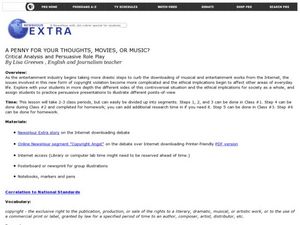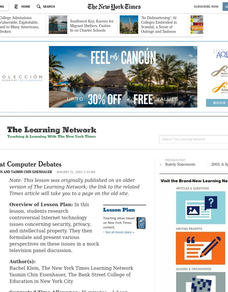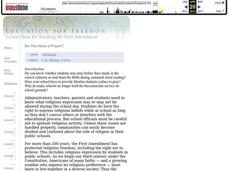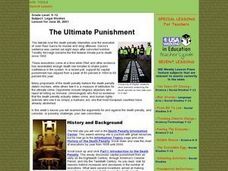Curated OER
A Tale of Two Towns
Learners compare and contrast their own community to other communities. They fill out a questionnaire and e-mail it to e-pals in other communities, take digital pictures of important places in their town, and compare them to pictures...
Curated OER
Introduction to Field Mapping with a Compass and Pace
Students practice using compass and calibrate their own pace, take field measurements of pre-set course with compass and pace, convert measurements into map, using angles and vectors, and make composite class map by adjusting different...
Curated OER
A Penny for Your Thoughts, Movies, or Music?
Young scholars investigate copyright violation laws. In this media copyright lesson, students read two articles that discuss copyright laws, then they develop their own perspective on the laws. Young scholars then divide into...
Curated OER
Reconstruction: A Time of Turbulence
Students utilize knowledge and understandings of the Civil War to look at the reconstructive era that followed. In this reconstructive era lesson, Students gain understanding of the definition of reconstruction by building, taking apart...
Curated OER
Service Learning
Students view video clips to define service learning. For this civics lesson, students read quotes, take a survey, and define altruism. Students view video clips and evaluate the motivation and impact of those who perform community...
Curated OER
What did I find?
Students excavate an artifact. For this archaeology lesson, students get a bucket filled with dirt and a broken up artifact. They work in groups to take it out and to find what its purpose was.
Curated OER
Burning Issues
Students study fire management. In this science lesson plan, students recognize and understand what they think would be the most responsible and appropriate actions to take in regards to fire managment.
Curated OER
Social Studies--Important People/Groups of the Holocaust
Students take the personas of eight different groups of people involved in the Holocaust. In this lesson about the Holocaust, students view "The Rise and Fall of Adolph Hitler" students view and discuss the video, focusing on...
Curated OER
Building Up, Breaking Down
Students investigate how rocks are modified into construction materials. In this building up and breaking down lesson plan, students explore what happens to building materials over time and how people modify natural materials. Students...
Curated OER
The Great Computer Debates
Students research controversial Internet technology issues concerning security, privacy, and intellectual property. They formulate and present various perspectives on these issues in a mock television panel discussion.
Curated OER
Remembering to Never Forget
Students discover how the history of a place or event affects one's present perceptions of that place or event. They examine the current tensions caused by the decision to make Weimar, Germany Europe's cultural capital.
Curated OER
Genocide-Holocaust
Twelfth graders gain insight and perspective as to how and why the Holocaust occured. They explain why the specific groups were targeted, and complete a brief paragraph about what it would have been like to live during this era.
Curated OER
No Bones About It
Students act as paleontologists, examining pictures of dinosaur skeletons and applying their knowledge of the relationship between skeletal features and survival, to create 'Paleontology Reports' about their perceptions of the lives of...
Curated OER
Learning About Maps
Learners take a "field trip" with the teacher through the school then draw a diagram of what they saw. They bring the maps to the computer lab where they create electronic maps using the software program Neighborhood Map Machine.
Council for Economic Education
Cost/Benefit Analysis: Three Gorges Dam
Middle schoolers, in groups, take various roles in evaluating the costs/benefits of the Three Gorges Dam project on the Yangtze River in China.
Curated OER
Do You Have a Prayer?
Students review the 1st Amendment and the clauses which deal with prayer/religion in schools. They discuss, in groups, the Equal Access Act, which gives students the right to practice/express their religion at school and take a quiz on...
Curated OER
Autumn
Take a walk through the forest as the leaves change color and fall from the trees, making way for a new ecosystem cycle to cycle through. An inquiry-based lesson plan examines how the process of decomposition eliminates tons of...
Curated OER
The Race
Students play game simulating route turtle hatchlings take from clutch to ocean, and describe threats hatchlings face and how this affects the marine turtle population.
Curated OER
The Ultimate Punishment
Students discover information about the death penalty debate. They explore the history of the death penalty and how it has changed over time. They examine supporting and opposing viewpoints of the issue.
Curated OER
Look Before You Think: How To Appreciate a Painting
Young scholars develop an elementary understanding of the history of art. They study the basic elements of a painting including perspective, composition, color, light and symbolism. They look at each selected painting and analyze it,...
Curated OER
Rape: Psychology, Prevention and Impact
Students are introduced to the characteristics of rape. As a class, they identify statements as either facts or myths about rape. In groups, they complete a survey to identify their own perceptions about rape and compare them with...
Curated OER
Language Arts: Writing Skills Development
Students improve writing skills by expanding their self-perceptions. Next, they develop idea lists for writing topics. Their ideas become the basis for a class newspaper. following the creation of a group composition, students write...
Curated OER
Four Enlightenment Thinkers
Students examine lives, philosophies, and political beliefs of four Enlightenment Thinkers: Baron de Montesquieu, Jean-Jacques Rousseau, Thomas Hobbes, and John Locke. Students then work with partner to write short speech from...
Curated OER
Understanding Latitude, Longitude, and Time Zones
Students take an imaginary world tour by locating cities with latitude and longitude. They plan an itinerary and calculate the time zones from which they would call home. Then they construct word problems involving travel across time zones.























